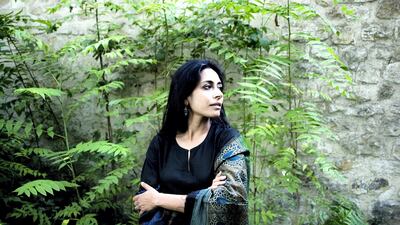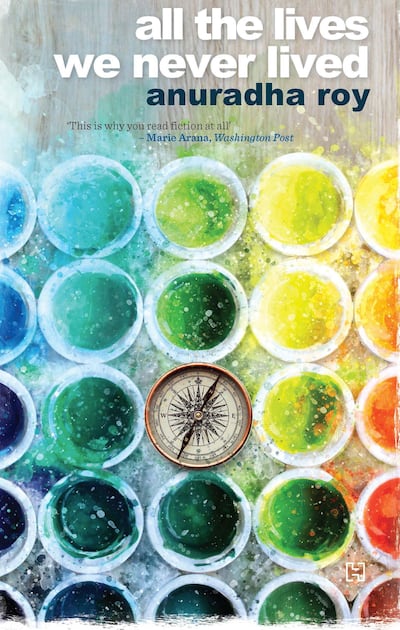It's way past 7pm and the Jaipur Literature Festival is shutting down for the night. It has been dark for an hour or so and the air is chilly. Most people jumped in a taxi long ago. But Anuradha Roy is still perched in one corner of the press terrace, giving interviews. The Indian author, who last year published All the Lives We Never Lived, is a sensation here – everywhere, in fact – and a lot of people want to talk to her.
She doesn't seem to mind. When it's my turn, I apologise that she is having to sit here in the cold all this time. "I live in [temperatures of] minus one," she says, laughing. "So it's not freezing at all."
Roy lives on a remote farm in the Himalayas with her husband, publisher Rukun Advani, and their two dogs. It is from this isolated spot that she has written four extraordinarily beautiful novels in 10 years, including her disorientating 2008 debut, An Atlas of Impossible Longing, since translated into 18 languages, and Sleeping on Jupiter, which was longlisted for the Booker Prize in 2015.
All The Lives We Never Lived is narrated by an Indian man called Myshkin, who is still struggling to come to terms with his mother's abandonment of him as a child.
It is Roy’s most impressive work yet – ambitious in scope, shifting from India to Bali and Nazi Germany, but also obsessive in its attention to the details, the little flints of memories, that make up a life.
“Her nostrils are flared, her eyes focus intensely on me, her thick straight eyebrows are joined together in a frown,” says Myshkin at one point, recalling the mother who left him when he was just nine years old. “She is scratching her head with the wooden end of a paintbrush and her hair stands up in an untidy clump as she pushes the brush.”
Her writing journey
When you read Roy's quiet, unfussy prose, which carries you along almost imperceptibly, it is difficult to believe that she did not become a published novelist until the age of 40. Other things always got in the way. Roy, who was born in Kolkata in 1967, worked for many years in New Delhi at Oxford University Press, where she met Advani. When they got married, however, a dispute ensued with OUP (the company allegedly prohibits couples from working together, something it denies), so in 2000, Roy and Advani founded their own publishing company, Permanent Black.
“Life was very uncertain,” she says. “It seemed like a very dark time and somehow that was when this whole space for writing a novel appeared and became something I needed to do. I think you only write if you actually need to write. That’s certainly how it is for me.”
Needing to write does not make the process any easier, though. Earlier in the afternoon, during Roy's session at the Jaipur Literature Festival, she described writing Sleeping on Jupiter as "very painful", admitting that, "in the end, I did not want to go into that room and face the writing". Such anguish is not uncommon among novelists, but nonetheless, Roy's turmoil seems extreme, debilitating even.
When I ask her about this, though, she is keen to clarify the point. "I don't think I ever don't enjoy it, because I know I will get through that," she says. "You have to have these lonely, barren, despairing stretches and then you come out of the other side and feel so exhilarated when you crack something. It's like a puzzle that you solve in your mind."
Focusing on issues that matter
The puzzle for readers of All The Lives We Never Lived is in understanding what motivated Myshkin's mother, Gayatri, to abandon her son. We know how terribly it has clouded Myshkin's life and yet … and yet. Are we really prepared to forgive Gayatri for sacrificing family in the pursuit of artistic freedom?
Roy tells me that she was surprised by how many people wrote to her refusing to accept that a mother could do such a thing. In a funny sort of way, this validated her novel. “Particularly in India, if a man leaves home on a quest for scholarship, religion, politics, whatever it is, he is valorised – a hero who has given up the bliss of domestic life to pursue his work,” she says. “And here was a woman doing it. [The response] confirmed everything I felt about the patriarchal notions still embedded in people’s minds.”
And what does Roy make of Gayatri? "I can understand her completely," she says. "I know that she is often not self-centred in a narcissistic way, but very sure of what she wants, aggravating and infuriating. But I really love her. I love her passion for what she is doing and I love her sense of the world as a place full of wonderment and beauty that she wants to find for herself."
A realistic view of the world
Roy is aware, though, that the world is often not a place of wonderment and beauty. In an interview with The Guardian last year, she said: "Inequality here [in India] has never been more catastrophic." With the Indian elections due to take place later this year, however, Roy remains optimistic that things can change in her country.
“Anything could happen,” she says. “Everyone is very fearful of the coming elections because you feel as if there may be a lot of violence. We don’t know what will happen, but I am hopeful. If I didn’t think there might be change, I don’t think I could live. The very people who are quite oppressed now – women – I think they will do something and there will be change.”
All The Lives We Never Lived is full of Indian characters but it is not an "Indian" novel. Or rather, it is not what the West expects an "Indian" novel to be – explicitly about religion or caste or Indian culture. "The novel is very internal," says Roy. Perhaps this shouldn't be noteworthy, but it is.
Writing about what she wants to write
In another session, British novelist Hari Kunzru, whose father was from Kashmir, argued that because of the success of novels such as Salman Rushdie's Midnight's Children, "the notion of things that brown people should write became very particular". While white authors were celebrated for aesthetic experimentation, "a whole generation of [non-white] writers were encouraged to commodify their ethnic specificity for consumption by an international public". This, Kunzru said, meant writing about immigration or the smells of the kitchen.
Roy is sympathetic to this viewpoint, although she says that she hasn't experienced any kind of pressure from her publishers. "A New York writer might get away with writing about their nervous breakdown or whatever, but the publishing industry in the West isn't prepared to give writers from other cultures that kind of opportunity," she says.
"Sometimes I encounter reviews [of my books], which say it is not political enough or that the reviewer thought they would learn about Indian culture and didn't, things like that. But you can't pay attention to these things because you write the book you want to write."
What that next book will be, though, remains a mystery to Roy. “That’s a bit alarming,” she says, only half-joking. “I’m thinking, though, that’s a start.”
Another puzzle to solve is already beginning to form in her mind.
All The Lives We Never Lived by Anuradha Roy is out now, published by Hachette India



